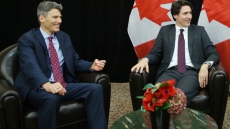The typical Canadian family will spend up to $420 more on groceries and dining out next year, getting little relief from a recent drop in the cost of food, suggests a new report released Monday.
A study by researchers at Dalhousie University in Halifax estimates food inflation will increase in 2017, driven by a falling loonie and U.S. president-elect Donald Trump’s first year in the White House.
Food prices overall are expected to rise between 3% and 5%, with meat (especially chicken and pork), vegetables, fish and other seafood among those projected to jump by 4% to 6%.
Fruit and nut prices are anticipated to go up between 3% and 5%, while the costs of dairy, eggs, bakery goods and cereals are forecast to increase by up to 2%. Restaurant costs will rise by 2% to 4%, the report says.
The study says the sweet spot for food inflation is between 1% and 2%, a rate it says is manageable for restaurateurs, grocery stores and consumers.
Sylvain Charlebois, the report’s lead author, says he wouldn’t be surprised if next year’s food inflation surpassed 4%.
“I think 2016 was volatile and 2017 will be, at the very least, equally as volatile,” Charlebois says.
Last year, Charlebois and the University of Guelph’s Food Institute, which he was previously affiliated with, predicted food prices would rise this year between 2% and 4% — or up to $345 for a family of two adults and two children. Based on data from January to October, the cost of food rose 2.5%, the report says.
Food prices fluctuated this year, rising rapidly before later easing off. In October, food prices recorded their first year-over-year drop in nearly 17 years, according to Statistics Canada.

Charlebois expects the cost of food to remain fairly stable over the holidays and into the new year, before starting to edge up around April. The two biggest factors behind that will be the Canadian dollar and the incoming Trump administration, he says.
The researchers expect the loonie to drop, bringing up the price of many of Canada’s imports, including produce and nuts.
Several Trump policies could drive up Canadian grocery bills for the next several years, according to the report. Trump, for example, could deport some of the estimated two million seasonal farm workers who are in the U.S. without legal permission, creating a production shortage and higher prices.
However, Charlebois doesn’t anticipate a recurrence of the so-called cauliflower crisis from earlier this year, when the cost of the vegetable soared to around $10 per head. He says retailers have learned from that and may temporarily halt the import of food with rapidly rising prices.
“They will just move on and import something else.”
Depending on where they live, Canadians will experience different levels of sticker shock at the grocery store and in restaurants, the report says.
Those living in Ontario and B.C. should prepare for above-average food inflation — around 4% to 5%, says Charlebois.

The study says residents of Newfoundland and Labrador, New Brunswick, Quebec, Manitoba and Alberta should enjoy below-average price increases, while the remaining provinces and the Northwest Territories should expect average rises in food costs.




